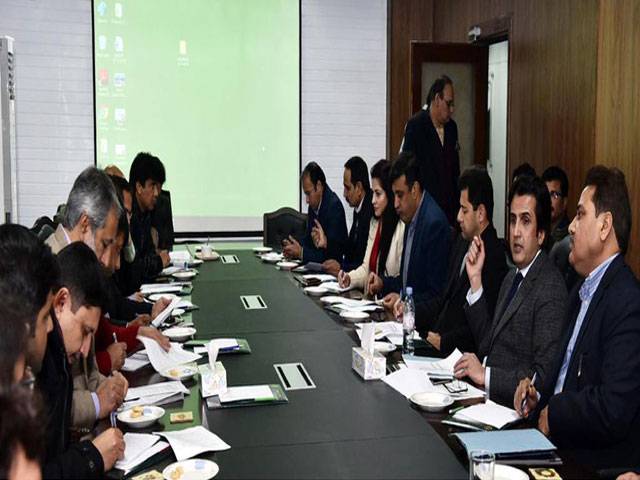ISLAMABAD - Federal Minister for Planning, Development & Reforms Khusro Bakhtyar has said that the previous government missed all targets set in 11th five-year plan and the average GDP growth was 4.8 percent.
The credibility of the growth performance of the 11th five years plan is also under scrutiny of the credible economists and based on their analysis the targets of the plan will be downward revised, said the federal planning minister while talking to a group of journalists here.
Regarding the upcoming five year plan, Khusro Bakhtyar said that the core objectives of the upcoming 12th five year plan is to create 10 million jobs in 5 years and enhance sustainability of the economic growth through building fundamentals,
The minister said that he has reviewed the performance indicators of 11th five year plan period (2013-18) with his economic team and found that targets of the plan were not achieved. The credibility of the growth performance of the 11th five years plan is also under scrutiny of the credible economists.
Giving the details, the minister said the average real GDP growth of 4.8 percent during the plan masked many inequalities like crop sector grew marginally by 0.6 percent in these five years which employs 38 percent of labour force. The 5.8% growth in 2017-18 was based upon 6 months data and will be revised on the basis of full year data. One example is large-scale manufacturing where growth was taken at 6.1% (7 months) that will be revised downward to actual full year growth of 5.2%.
He said that the consumption was artificially boosted to uplift economic growth through fiscal expansion and easy monetary policy. The quantum of consumption in Pakistan at 93 percent of GDP is one of the highest among emerging economies, whereas investment and savings are one of the lowest. The ratio in India is 70 percent and in Bangladesh is 74 percent whereas investment in these countries is above 30 percent while in Pakistan this ratio is just 16 percent. The savings rate in Pakistan is less than half of these countries, he added.
Total investment could not reach close to the target of 22.8 percent of GDP and stood at 16.4%, said the minister. The private investment rate continuously fell during the last 4 years in a row from 10.4 percent of GDP in 2014-15 to just 9.8 percent in 2017-18 when interest rates were at their historical low level. Public investment increased by 1.2 percentage points in this period to keep investment almost stable. National savings could not reach even at half the targeted level of 21.3% and fell to 10.4%, he further lamented.
The fiscal consolidation could not be achieved as the fiscal deficit missed by 300 basis points from the target set at 3.5% (Rs.1203 billion) reaching to 6.6% (Rs.2260 billion) in the terminal year of previous plan period. The outgoing government sowed the seeds of fiscal indiscipline by parking deficit in the commodity, PSEs and power sector deficits, which will continue to haunt the fiscal consolidation efforts.
The reckless borrowing increased the debt stock from Rs.16 trillion to around Rs.30 trillion and exerted enormous pressure on future generations. Expansion in current account deficit from 1.3% of GDP ($ 3.13 billion) in 2013-14 to 6.1% ($ 18.9 billion) of the terminal year was witnessed during the plan period. He said that 44 percent of GDP this year will consume in debt servicing.
Talking about the target of 12th Five-Year Plan, the minister apprised that while formulating the plan an in-house stocktaking exercise to look into the existing resources, challenges and window of opportunities is conducted regarding sectoral policies and its alignment with overall strategy of the government. The minister said that we are cognizant of the fact that the 12th Five-Year Plan is presented in the backdrop of serious macroeconomic imbalances and a huge structural deficit.
The minister apprised about challenges to the economy such as; regaining macroeconomic stability, fiscal consolidation; long-term sustainability of the external sector; creating employment and skill development; and poverty alleviation. Growth of the 11th five-year plan period strengthened the notion of economic growth without economic development. Thus, emphasis of macroeconomic policies of the present government will be on building fundamentals of the economy, stated the minister.
The minister said that macroeconomic imbalances of this magnitude could not be sustained for indefinite period and a home-growth macroeconomic stabilization with human face is needed at this moment. Stabilization must not suffocate economic growth. He stated that the growth strategy of the government is focusing upon building strength of economic fundamentals such as quality and inclusiveness of economic growth or human capital, upscaling technological capability, sustainable agriculture, social protection, strategic trade policy framework, national SME policy, financial inclusion, productivity and efficiency, and above all an investment strategy for efficient resource allocation.
He said that he also reviewed the targets for the 12th Five Year Plan and advised the relevant sections to deliberate with sectoral experts to firm up these targets. Core objective of the plan is to create 10 million jobs in 5 years and enhance sustainability of the economic growth through building fundamentals.






